May 22, 2025 | 18:45 GMT +7
May 22, 2025 | 18:45 GMT +7
Hotline: 0913.378.918
May 22, 2025 | 18:45 GMT +7
Hotline: 0913.378.918
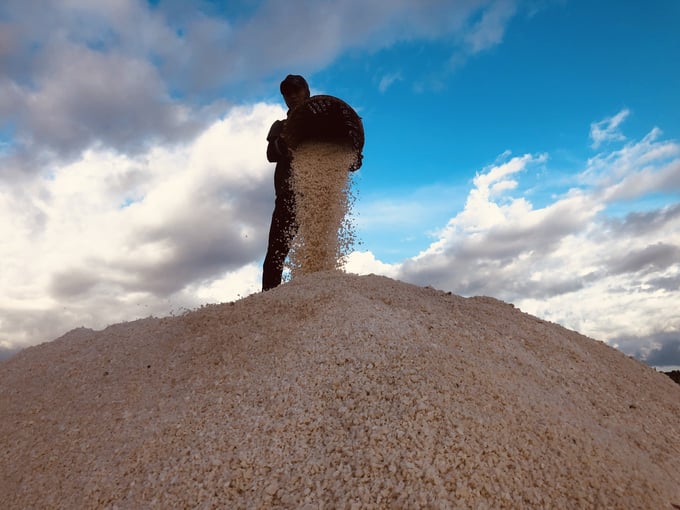
Pink salt of Bac Lieu. Photo: Phan Thanh Cuong.
As a producer and seller of pink salt, Mr. Nguyen Thanh Mong is aware that the pink salt area has decreased by 70-80% over the past seven or eight years.
His family produced 2 hectares of pink salt on soil ground in 2021, harvesting over 30 tons at a price as low as VND 800 per kilogram. The income was sufficient to cover the costs of petroleum and oil for pumper operation and labor, but not his efforts. Due to constant rainfall in 2022, he had no pink salt production. This year, he devotes half of his land to the cultivation of field covered with canvas. The current price of pink salt on the ground is over VND 2,000 per kilogram, whereas the price of white salt on canvas is over VND 3,000 per kilogram.
The salt production model in the Vinh Thinh commune has a long history and appears to be sustainable, but this area is also severely impacted by climate change, which threatens people's livelihoods.

Mr. Nguyen Thanh Mong prepares a salt-making tool. Photo: Duong Dinh Tuong.
According to Mr. Tran Chi Tinh - agricultural cadastral officer of Vinh Thinh commune, there was once a Truong Son salt cooperative with more than 100 members, and each delegate was given a jar of salt at the commune's Party congress, but the cooperative only existed for a few years. In 2014, the commune had over 600 hectares of salt, but by 2020, this area was reduced to make way for industrial prawn aquaculture. Currently, the entire commune has only 73ha of covered salt fields and 45ha of salt on the earth. On-site salt production is limited to a handful of enthusiasts, and a cooperative group of approximately 25 households is about to be established.
The advantage of the salt industry is that each year state funds are used to dredge canals. This, however, is insufficient to compensate for a series of obstacles, such as low and volatile prices, rising petroleum prices, high labor costs, unseasonable weather, and rain that causes salt on the field to precipitate quickly and dissolve.
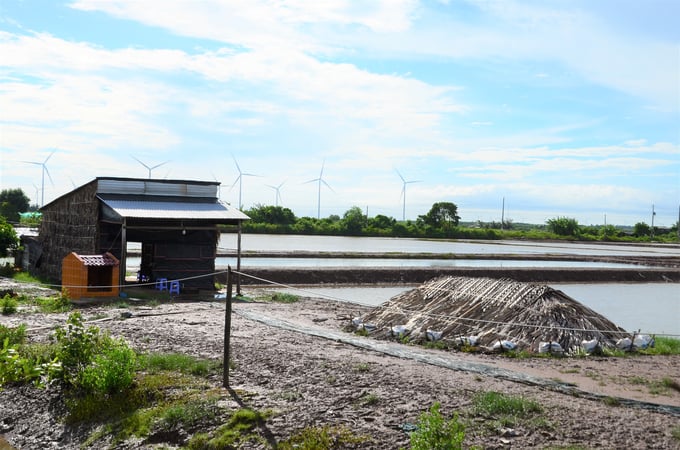
Salt field of Vinh Thinh commune. Photo: Duong Dinh Tuong.
The Mekong River streaming into the Bac Lieu Sea transports a great deal of alluvium, so the salt has a pink hue, is briny but not bitter, and tastes sweet. Currently, Cambodia imports Bac Lieu salt to salt seafood, create fish sauce, and dry. Due to its superior quality compared to other salts, it is exported to Japan and Korea to create kimchi and other delicacies.
According to Dr. Ngo Kieu Oanh, these "dirty" salts are extensively available on the international salt market and are sought after by high-end chefs and gourmets. And because modern people have been exposed to too many chemicals, they would prefer to return to consuming artisanal salt, which lacks aesthetic appeal but contains more minerals and is safer.
Currently, the trend of transitioning from salt to aquaculture has caused the entire district of Hoa Binh to have 132ha of salt, of which Vinh Thinh commune has more than 100ha and Vinh Hau commune has an infinitesimal few or three hectares. Aquaculture and salt production share an irrigation system that takes in and expels water. The saline area is merely "leopard skin" Agricultural planning is merely a piece of paper, and people conduct it haphazardly.
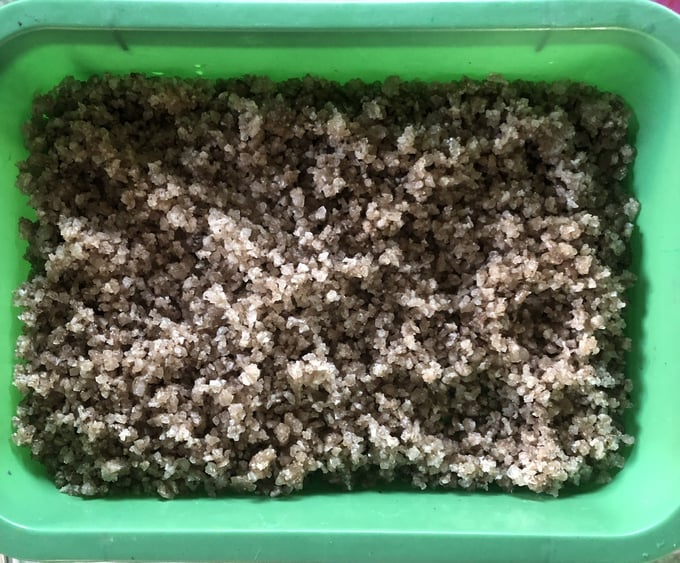
The crystallized salt tray of Mr. Co Tan Xuyen's house - Head of the Department of Agriculture and Rural Development, Hoa Binh district. Photo: Photo courtesy of Mr. Co Tan Xuyen.
Based on Dr. Ngo Kieu Oanh's recommendation, Mr. Co Tan Xuyen, head of the Hoa Binh district's Department of Agriculture and Rural Development, desired to create a "red seed" to restore the traditional salt artisan village of Vinh Thinh commune.
"Salt workers have always claimed that salt production is inefficient, so its value must be raised from a single to a multi-valued state. It is imperative to restrict salt in tarps and reinstate pink salt production on alluvial soil. If 1 hectare of favorable salt contains only 1,000 grains and is sold for 3,000 VND per kilogram, you will earn 30 million VND. Must produce impurity-free salt, which is not sold by the bushel but processed into seasoning salt for fruit dishes or sold in packaged form, gorgeously packaged, with the brand name Bac Lieu pink salt, and must clearly indicate the nutritional difference between it and other salts.
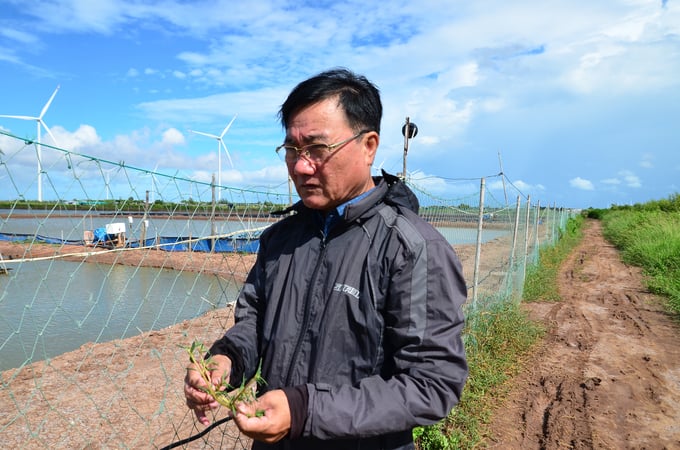
Mr. Co Tan Xuyen - Head of the Agriculture and Rural Development Department of Hoa Binh district is surveying salted vegetables and pink salt. Photo: Duong Dinh Tuong.
In addition to table salt, there are medicinal and cosmetic salts. In addition, there are pink salt water spas and nude baths (naked bathing) with pink salt to absorb toxins in the body, enhance respiratory health, and nourish the epidermis, according to Xuyen.
Mr. Xuyen's creation of salt-based trinkets depicting the 12 zodiac animals or other varieties of salt is a very original concept. This idea stems from old memories; he and his friends used to make mid-autumn lamp frames by placing the salt box on the table and waiting for the batch to complete. When you uncover the saltbox, you will find a lamp that resembles a glass frame, sparkling and displayed well beyond the full moon.
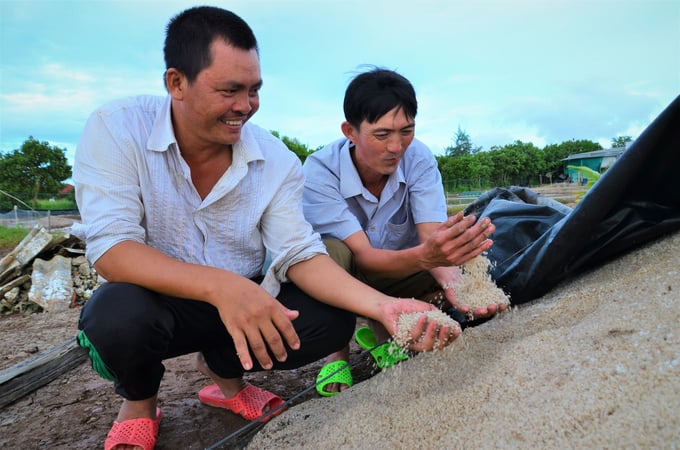
Bac Lieu pink salt has a lot of potential but has not yet been exploited. Photo: Duong Dinh Tuong.
In addition, he plans to create a display house for salt-making equipment, photographs of senior members of the industry, and a process flow chart for salt production. Together with the villagers, discuss how to embellish the hamlet's landscape and the house, and create a homestay where you will enjoy salt-spiced dishes such as salted roasted snakehead fish, roasted salted snakehead fish, salt-roasted crab, and pancakes.
"I fear that in 5 to 10 years, due to this extremely precipitous decline, no one will produce pink salt. Therefore, I decided to renovate 2 hectares of pink salt this year, as well as a nearby warehouse and display house. On the salt field, I intend to spend a crystallized yard as souvenirs, which will be animals and shapes of salt wrapped in paper and sold to travelers, etc.”, Xuyen said.
Translated by Linh Linh
![Reducing emissions from rice fields: [3] New values generated from carbon credit](https://t.ex-cdn.com/nongnghiepmoitruong.vn/608w/files/content/2025/05/19/dsc09613-144700_71-150957.jpg)
(VAN) In addition to helping safeguard the environment, the low-emission rice cultivation model also generates new opportunities for farmers by leveraging the carbon credit market.
![Ho Chi Minh city adapts to climate change: [1] Vulnerable in the whirlwind of development](https://t.ex-cdn.com/nongnghiepmoitruong.vn/608w/files/duyenht92/2025/05/19/3131-ngap-nongnghiep-163121.jpg)
(VAN) As the country's economic engine with a rapid urbanization rate, Ho Chi Minh city is facing increasingly serious consequences of climate change.

(VAN) On May 21, Minister of Agriculture and Environment Do Duc Duy worked with Mr. Olivier Brochet, Ambassador Extraordinary and Plenipotentiary of the French Republic to Vietnam.
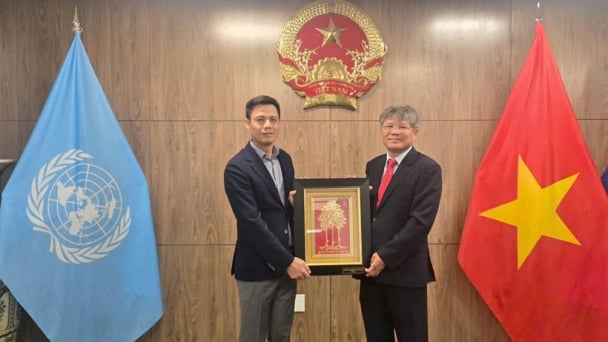
(VAN) VRG recently conducted a visit and working trip to the United States to demonstrate its efforts in redefining the role of rubber enterprises in the global value chain.

(VAN) In 2024, over 295 million people across 53 countries and territories faced acute hunger—an increase of almost 14 million people compared to 2023, while the number of people facing catastrophic levels of hunger reached a record high.

(VAN) World Environment Day 2025 (June 5) carries the theme 'Beat Plastic Pollution' continuing to emphasize the global urgency of addressing the plastic waste crisis.

(VAN) This was the assessment shared by experts at the workshop titled 'Assessing the Role and Potential of Low-Emission Rice Production Systems in Vietnam,' held on the morning of May 19.